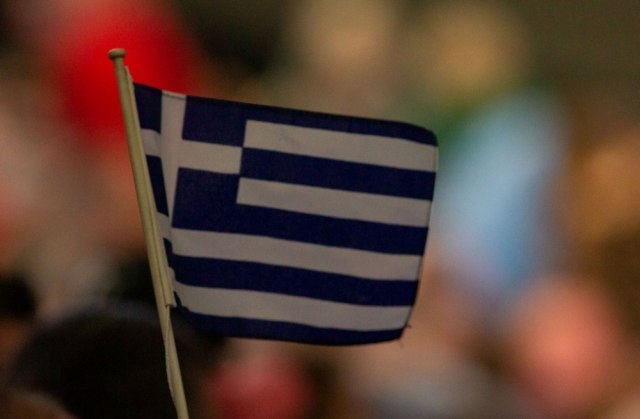Greece and Albania at war, threat of veto arrived
Greece and Albania, two NATO members, are officially still at war.
Wednesday, 06.12.2023.
10:59

Greece and Albania at war, threat of veto arrived
Moreover, they also facing a big problem with minorities. Greece is now indirectly threatening to veto the beginning of Albania's accession negotiations to the European Union.Altin Meshini is a successful producer of organic cheese in Përmet in southern Albania.
His shop is a real tourist attraction: it is located in a large bunker built in 1939 by Mussolini's Fascist Italy and used by Italian soldiers to shell Greek army trenches during the Greco-Italian War of 1940-41.
At that time, Albania was occupied by Italy. After the Greek army pushed back the Italians, bloody fighting broke out around Përmet. According to the Greek Embassy in Tirana, during the Greco-Italian war, around 8,000 Greek soldiers died in Albania, of which 1,300 were buried in cemeteries in Albania. For Altin Meshini, preserving war memories like this is an important step towards understanding how precious life and peace are. "Look at my dairy," he told DW, "it was originally built to take lives in an absurd war. And I use it to feed lives in peace."
People like Meshini may have learned the lessons of the past, but the same cannot be said for the relationship between Albania and Greece. Bilateral relations between the two countries have been strained for a long time, and many problems have their roots in the past.
Albania and Greece are officially still at war
These include disagreements over the delimitation of maritime areas, the state of war between the two countries which officially still continues, and the issue of property rights of members of the Greek minority in Albania.After Italy attacked Greece from the territory of occupied Albania, Greece declared war on Albania in October 1940. Although Albania and Greece signed a friendship agreement in 1996, the two NATO members are technically still at war. According to the representative of the Greek Ministry of Foreign Affairs, the Greek government agreed to end martial law back in 1987, but the Greek parliament never ratified that decision. Martial law has long been a source of tension between the two countries.
Ending martial law is important for Albania, as it could open the door to reparations negotiations for the Chamis minority. That Albanian minority lived for a long time in today's northwestern Greek region of Epirus. After World War II, Greece expelled and confiscated the property of a large number of Muslim Chams because they allegedly collaborated with the occupiers. After the end of the dictatorship in the 1990s, Albania sought reparations from Greece, and the Chams ethnic group in Albania is pushing for the right to return to Greece. No success so far.
Greek candidate for mayor arrested in Albania
However, the biggest point of contention between the two countries is currently the case of Freddy Belleri, a 52-year-old member of the Greek minority in Albania, who was elected mayor of the Albanian municipality of Himara on May 14, 2023. Most of the people living there are Albanian Greeks.Belleri was unable to take the oath, as he was arrested on charges of vote-buying. He flatly denies it. All of his requests for release or for assuming office have been rejected by the Albanian courts so far. In the background of that case is probably the fight for land and real estate on the picturesque Adriatic coast of Albania and the potential of Himara as a tourist resort.
"Many properties on the coast belong to ethnic Greeks who live in Himara and the surrounding villages," says Skerdian Duli, a lawyer from Himara. "However, for various reasons - primarily due to corruption in public institutions dealing with real estate - local owners cannot invest in their real estate." Local Albanian property owners were also affected.
The reason is the specificity of Albanian legislation for coastal areas. All investments there must be approved by a national body headed by Prime Minister Edi Rama. In addition, this national territorial council can designate investors who can invest in the property of local owners.
Lawyer Duli believes that this unusual regulation is actually a way to "rob the property of local owners". According to him, there are about 4,000 such "overlapping lots" in Himara. Freddy Belleri, who is in opposition to Prime Minister Rama's ruling Socialist Party (PS), promised to change that when he becomes mayor.
Greece reacted strongly to Belleri's arrest and detention, accusing Albania of violating the rule of law and the rights of the Greek minority. Athens claims that Belleri's detention was politically motivated, and has hinted that it could block the start of Albania's negotiations on joining the European Union. In order to start those negotiations, we need to remind you that all EU members should vote for it.
Deep mistrust
According to the journalist and writer Stavros Tzimas, mutual mistrust plays a very important role in the relations between Greece and Albania:"Since the years of the communist dictator Enver Hoxha and the time when that country was isolated, the feeling of being surrounded by the enemy prevailed in Albania. In the circles of politicians, historians and journalists constantly suspect that Greece intends to dismember Albania," Tzimas told DW, but added that "there is mistrust on the Greek side as well - although the Greek public is actually not very interested in what is happening in Albania.
Let's go back to the organic dairy in the former bunker in Përmet. There, Altin Meschini looks to the future: "Many Italians and Greeks come every year. It attracts them," he says.
"The unusual history of the bunker." And he concludes: "When we talk about the past, we all agree that we want to live in peace and have good neighborly relations. We want the past to remain in history and not loom over our present and future''.





























































Komentari 2
Pogledaj komentare